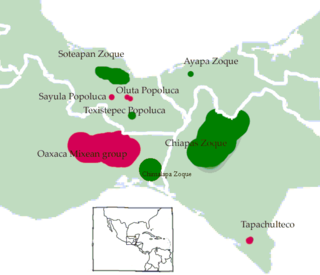Rumpun bahasa Mixe-Zoque
Tampilan
| Mixe–Zoque
Mije–Soke | |||||||||
|---|---|---|---|---|---|---|---|---|---|
| Wilayah | Mesoamerica: Meksiko Oaxaca, Chiapas, Tabasco, Veracruz | ||||||||
Penutur | |||||||||
| |||||||||
| Kode bahasa | |||||||||
| ISO 639-3 | – | ||||||||
| Lokasi penuturan | |||||||||
Lokasi dimana rumpun bahasa Mixe–Zoque dipakai: Mixe (red) and Zoque (green) | |||||||||
Rumpun bahasa Mixe–Zoque adalah sebuah rumpun bahasa yang dituturkan di wilayah Tanah Genting Tehuantepec, Meksiko. Pemerintah Meksiko mengakui tiga bahasa Mixe–Zoquea: Mixe atau ayook dengan 188.000 penutur, Zoque atau o'de püt dengan 88.000 penutur, dan Popoluca dimana beberapa diantaranya adalah penutur bahasa Mixe dan Zoque dengan 69.000 penutur.
Catatan
[sunting | sunting sumber]Referensi
[sunting | sunting sumber]- Campbell, L., and T. Kaufman (1976), "A Linguistic Look at the Olmecs", American Antiquity, 41 pp. 80–89.
- Justeson, John S., and Kaufman, Terrence, (1997),"A Newly Discovered Column in the Hieroglyphic Text on La Mojarra Stela 1: a Test of the Epi-Olmec Decipherment", Science, 07/11/97, Vol. 277 Issue 5323, p. 207.
- Justeson, John S., and Kaufman, Terrence (2001) Epi-Olmec Hieroglyphic Writing and Texts Diarsipkan 2011-05-25 di Wayback Machine..
- Kaufman, Terrence, (2001) Nawa linguistic prehistory, published at website of the Mesoamerican Language Documentation Project Diarsipkan 2016-03-03 di Wayback Machine.
- Wichmann, Søren (1995). The Relationship Among the Mixe–Zoquean Languages of Mexico. Salt Lake City: University of Utah Press. ISBN 0-87480-487-6.
- Wichmann, Søren (1998). "A conservative look at diffusion involving Mixe–Zoquean languages". Dalam Roger Blench and Matthew Spriggs (eds.). Archaeology and Language, vol. II: Correlating archaeological and linguistic hypotheses. One World Archaeology series, no. 29. London and New York: Routledge. ISBN 0-415-11761-5. OCLC 35673530.
- Brigham Young University press release on behalf of Brigham Young University archaeologist Stephen Houston and Yale University professor emeritus Michael Coe disputing Justeson/Kaufman findings.

